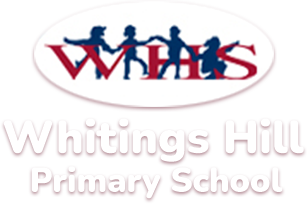Computing
Computing at Whitings Hill
“A high-quality computing education equips pupils to use computational thinking and creativity to understand and change the world”
(National Curriculum 2014)
Intent
At Whitings Hill, our aim is to provide our children with a computing curriculum which ensures they are digitally literate, can become active participants in an ever-changing digital world and are well-prepared for the challenges of the future workplace.
We aim to ensure that the objectives that are set out in the National Curriculum are delivered in the most practical, immersive, engaging way possible to support children in embedding the computing knowledge required and opportunity to practise and develop key skills to nurture a real understanding of the subject.
New computing vocabulary is taught discreetly within computing lessons. This vocabulary is then continually referred to, both within the school environment and in cross-curricular lessons e.g. using the term ‘algorithm’ when writing a set of instructions in English. This helps to ensure the children ‘learn more, remember more’.
Alongside our Computing curriculum, we also as a school fully understand and recognise the fundamental importance of teaching online safety, and recognise that it must be reinforced regularly. We educate all pupils on how to ensure they have a positive digital footprint, which is increasingly important in the digital world they are growing up in. We ensure pupils know how to stay safe online and where to go to receive support if required. Alongside continual teaching of online safety, we deliver an annual Internet Safety Week and remind children of rules learnt through assemblies and the wider school environment. Through this, we recognise that parents play a pivotal role in keeping children safe online. For this reason, we regularly keep parents updated through newsletters, the school website and online safety workshops.
Implementation
We teach the National Curriculum, supported by ‘Teach Computing’, which provides rich and varied learning experiences for all pupils with progressive sequences of lessons from Year 1 to Year 6 (with ‘Barefoot Computing’ resources being used to help facilitate the learning towards the relevant Early Learning Goals in our EYFS). Albeit a new scheme, this scheme supports our teachers to ensure that the children’s skills progress year on year. Lessons are delivered in fun, practical, engaging ways and this includes using laptops for units of work such as creating sound, editing images, using floor bots for programming and using tablets for taking photos and evaluating these.
There is clear planning saved on the shared drive for all teachers to access. This planning sets out the learning for the year which is split up into each half-term and within this, six clear ‘WALT’ objectives are given. To ensure staff are aware of how lessons can implement some aspects from the 2020 ‘Education for a Connected World’, the eight different strands are labelled next to each WALT lesson (see MTP for more detail on these). Having this information labelled on the Medium Term Planning is key so staff can see how certain strands of online safety can be touched upon in each lesson. To support online safety even further, we celebrate ‘Safer Internet Week’ as a whole school. This is part of an online safety week, which involves assemblies and a parent session. Links and information regarding online safety is also shared and uploaded onto the school website (Whitings Hill Primary School - E-Safety (greenhousecms.co.uk) so parents/guardians are well equipped with resources which provides them with valuable hints, tips and ideas to support the children remaining safe when they are not present on site.
Lessons are evidenced in different ways, such as children using their own computing books, work being saved in pupil folders and through pictorial evidence.
Alongside clear, easy-to-follow planning, all resources from the Teach Computing website have been saved onto the shared which allows staff to adapt where necessary prior to the lesson being taught. The Computing co-ordinator is on hand and keen to support any members of staff who may have a question about things such as a particular lesson, a particular resource etc. There are many different ways this occurs, through conversations and by making staff aware of CPD offered by Teach Compute themselves.
Impact
- Children will be confident users of technology, able to use it to accomplish a wide variety of goals, both at home and in school.
- Children will have a secure and comprehensive knowledge of the implications of technology and digital systems. This is important in a society where technologies and trends are rapidly evolving.
- Children are confident in using a range of different devices and technology, and understand that ‘computing’ is an incredibly broad word.
- Children will be able to apply the British values of democracy, tolerance, mutual respect, rule of law and liberty when using digital systems.
- We want children to develop computing skills so that they leave primary school computer literate.
- Parents and guardians feel supported in helping their child remain safe online when not in school
- Children really enjoy their computing lessons and the many practical opportunities they have as they progress through the school.
- Staff will become increasingly confident in teaching all aspects of the computing curriculum, with the computing co-ordinator on hand to support as and when necessary.
- Impact of the new curriculum is gathered through different ways such as pupil/staff voice, and an evaluation of this occurs ahead of the units being repeated next academic year (2023-2024).
